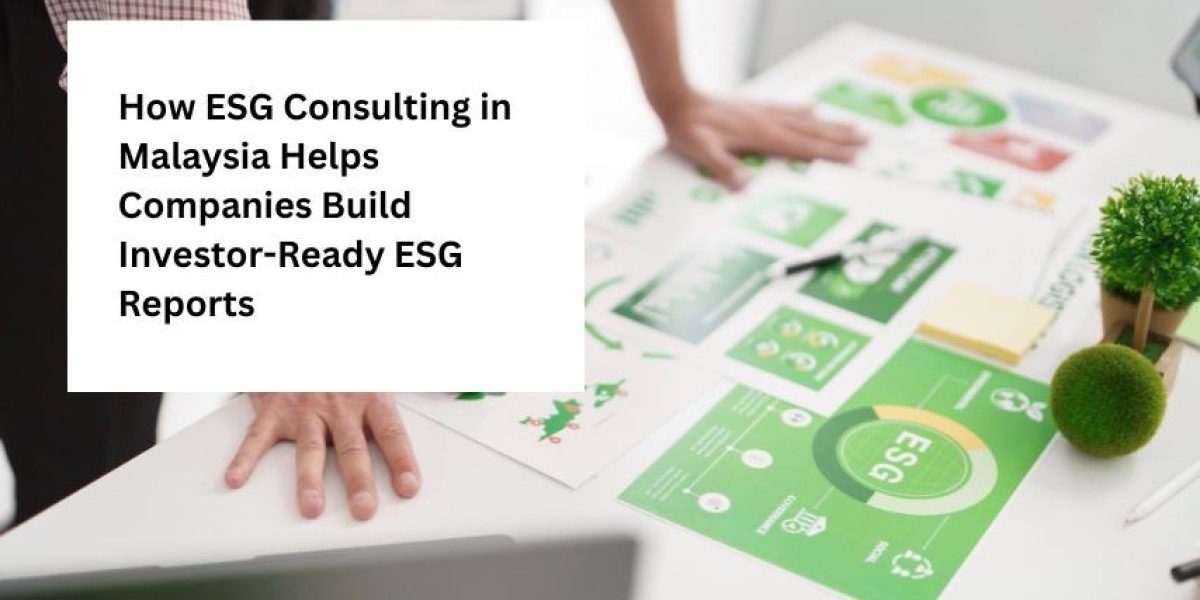The corporate landscape has experienced a seismic shift in recent years. Companies are no longer measured solely by their financial performance. Investors, stakeholders, and consumers now demand transparency about environmental impact, social responsibility, and governance practices. This comprehensive approach to business evaluation has placed Environmental, Social, and Governance (ESG) reporting at the center of corporate strategy.
For Malaysian companies looking to compete on the global stage, ESG reporting represents both an opportunity and a challenge. While the benefits of strong ESG practices are clear, creating investor-ready reports requires specialized knowledge and expertise. This is where ESG consulting firms in Malaysia play a crucial role, bridging the gap between corporate ambitions and investor expectations.
Understanding ESG and Its Growing Corporate Importance
ESG encompasses three critical dimensions of sustainable business practices. Environmental factors examine a company's impact on natural resources, climate change mitigation efforts, and waste management strategies. Social considerations evaluate employee welfare, community engagement, diversity initiatives, and human rights practices. Governance assesses leadership structure, executive compensation, audit processes, and shareholder rights.
The momentum behind ESG has accelerated dramatically. According to PwC's Global Investor Survey, 79% of institutional investors consider ESG risks when making investment decisions. This shift reflects growing awareness that companies with strong ESG practices often demonstrate better long-term financial performance, reduced regulatory risks, and enhanced resilience during market volatility.
Malaysia's position as a key economic hub in Southeast Asia makes ESG adoption particularly significant. The country's diverse economy, spanning manufacturing, agriculture, technology, and services, requires tailored approaches to ESG implementation. Companies operating in palm oil, manufacturing, and technology sectors face unique environmental and social challenges that must be addressed to meet international standards.
The Bursa Malaysia ESG Guide introduced in 2018 marked a turning point for local companies. This framework established clear expectations for ESG disclosure, pushing Malaysian corporations to develop comprehensive reporting mechanisms. However, translating these requirements into investor-ready reports requires specialized expertise that many companies lack internally.
ESG Consulting's Role in Global Standards Alignment
Top ESG consulting firms in Malaysia like Wellkinetics serve as critical intermediaries between local companies and international frameworks. These consultants bring deep understanding of global standards such as the Global Reporting Initiative (GRI), Sustainability Accounting Standards Board (SASB), and Task Force on Climate-related Financial Disclosures (TCFD).
Malaysian consultants help companies navigate the complex landscape of ESG frameworks. Each framework has specific requirements, metrics, and reporting formats. For instance, GRI focuses on stakeholder engagement and materiality assessment, while SASB emphasizes industry-specific metrics that affect financial performance. TCFD concentrates on climate-related risks and opportunities.
The challenge for Malaysian companies lies in selecting appropriate frameworks and implementing them effectively. ESG consultants provide strategic guidance on framework selection based on company size, industry sector, and target investor base. They also ensure that chosen frameworks align with both local regulatory requirements and international investor expectations.
Consultants play a vital role in keeping companies updated on evolving standards. ESG frameworks continuously evolve as new environmental and social challenges emerge. For example, recent updates to climate disclosure requirements reflect growing investor focus on transition risks and physical climate impacts. Malaysian companies need expert guidance to stay current with these changes and maintain compliance.
Key Components of Investor-Ready ESG Reports
Creating reports that resonate with investors requires understanding what information they value most. Investor-ready ESG reports must demonstrate material impact, measurable progress, and strategic integration with business operations.
Materiality assessment forms the foundation of effective ESG reporting. This process identifies which environmental, social, and governance issues most significantly impact business operations and stakeholder value. Malaysian companies operating in different sectors face varying materiality concerns. A technology company might prioritize data privacy and cybersecurity, while a manufacturing firm focuses on emissions reduction and worker safety.
Quantitative metrics provide the backbone of credible ESG reports. Investors seek specific, measurable data that enables comparison across companies and tracking of progress over time. Key performance indicators might include carbon emissions intensity, employee turnover rates, board diversity percentages, and community investment amounts. The challenge lies in collecting accurate data and presenting it in formats that investors can easily interpret.
Strategic narrative connects ESG performance to business strategy and financial outcomes. Investors want to understand how ESG initiatives create value, mitigate risks, and position companies for long-term success. This narrative must demonstrate leadership commitment, resource allocation, and integration of ESG considerations into decision-making processes.
Forward-looking commitments and targets show investors that companies take ESG seriously as an ongoing priority. Science-based targets, diversity goals, and governance improvements provide clear benchmarks for future performance evaluation. These commitments must be realistic, time-bound, and aligned with broader corporate strategy.
ESG Consulting Support for Data Collection and Analysis
Data collection represents one of the most significant challenges in ESG reporting. Malaysian companies often struggle with fragmented data systems, inconsistent measurement approaches, and lack of baseline information. ESG consultants provide structured methodologies for gathering, validating, and analyzing ESG data across organizations.
Consultants begin by conducting comprehensive data audits to identify existing information sources and gaps. This process involves reviewing financial systems, operational databases, human resources records, and environmental monitoring systems. They also assess data quality, consistency, and reliability to ensure accurate reporting.
Technology integration plays a crucial role in modern ESG data management. Consultants help Malaysian companies implement software solutions that automate data collection, improve accuracy, and streamline reporting processes. These systems often include dashboard capabilities that enable real-time monitoring of key ESG metrics.
Stakeholder engagement requires specialized skills that consultants bring to the table. Effective ESG reporting involves gathering input from employees, customers, suppliers, communities, and investors. Consultants design engagement processes that capture meaningful feedback while managing diverse stakeholder expectations and communication preferences.
Data analysis transforms raw information into actionable insights. Consultants apply statistical methods, benchmarking techniques, and trend analysis to help companies understand their ESG performance relative to peers and industry standards. This analysis often reveals improvement opportunities and strategic priorities that might not be apparent from raw data alone.
Benefits of Strong ESG Reporting for Investment Attraction
Investor-ready ESG reports deliver tangible benefits that extend beyond compliance requirements. Companies with comprehensive ESG reporting often experience improved access to capital, reduced borrowing costs, and enhanced valuation premiums.
Capital market access has become increasingly dependent on ESG credentials. Malaysian companies seeking international investment must demonstrate ESG compliance to access global capital markets. Institutional investors, particularly those with sustainability mandates, require detailed ESG information before making investment decisions. Strong reporting capabilities expand the potential investor base and improve fundraising prospects.
Cost of capital benefits reflect investor perception of reduced risk associated with well-managed ESG practices. Companies with transparent ESG reporting often receive better credit ratings and lower borrowing costs. This advantage stems from investor confidence in management quality and reduced exposure to environmental, social, and regulatory risks.
Valuation premiums reward companies that effectively communicate ESG value creation. Research consistently shows that companies with strong ESG reporting trade at higher multiples than peers with limited disclosure. This premium reflects investor recognition of better risk management, operational efficiency, and long-term value creation potential.
Competitive positioning advantages emerge from ESG leadership in specific sectors. Malaysian companies operating in industries with significant environmental or social impacts can differentiate themselves through superior ESG reporting. This differentiation attracts ESG-focused investors and customers while potentially commanding premium pricing for products and services.
Overcoming ESG Reporting Challenges
Malaysian companies face numerous obstacles in developing effective ESG reports. These challenges range from resource constraints and technical expertise gaps to cultural adaptation and stakeholder alignment issues.
Resource allocation represents a significant challenge, particularly for smaller companies. ESG reporting requires dedicated personnel, technology investments, and ongoing operational costs. Consulting firms help companies develop cost-effective approaches that maximize impact while managing expenses. This might involve phased implementation, technology sharing arrangements, or outsourced data management services.
Technical expertise gaps affect most Malaysian companies entering ESG reporting. Few organizations have internal capabilities for framework selection, data analysis, and report preparation. Consultants provide knowledge transfer through training programs, workshops, and collaborative report development processes. This approach builds internal capabilities while ensuring high-quality initial reports.
Stakeholder alignment challenges arise when different groups have competing priorities or expectations. Consultants facilitate stakeholder engagement processes that identify common ground and develop balanced approaches to ESG reporting. They also help companies communicate ESG strategies effectively to diverse audiences with varying levels of technical knowledge.
Cultural adaptation requirements reflect the need to balance international standards with local business practices and social contexts. Malaysian companies must demonstrate ESG compliance while respecting cultural values and traditional business relationships. Consultants with local expertise help navigate these complexities and develop culturally appropriate ESG strategies.
Regulatory compliance complexity increases as both local and international requirements evolve. Malaysian companies must satisfy Bursa Malaysia requirements while potentially adhering to standards in other jurisdictions where they operate or seek investment. Consultants provide regulatory intelligence and compliance mapping to ensure comprehensive coverage.
The Strategic Value of ESG Consulting in Malaysia
The partnership between Malaysian companies and ESG consulting firms represents more than a compliance exercise. It embodies a strategic transformation that positions businesses for long-term success in an increasingly sustainability-focused global economy.
ESG consulting provides the expertise, tools, and processes necessary to transform corporate aspirations into investor-ready reports. These consultants understand the nuanced requirements of different stakeholder groups while maintaining focus on material business impacts and value creation opportunities.
For Malaysian companies, the choice is clear. Those that invest in professional ESG consulting support will be better positioned to attract investment, manage risks, and capitalize on emerging opportunities. The companies that treat ESG reporting as an afterthought risk being left behind as capital flows increasingly toward sustainability leaders.
The future belongs to organizations that can demonstrate genuine commitment to environmental stewardship, social responsibility, and governance excellence. ESG consulting firms in Malaysia provide the bridge between current capabilities and future requirements, ensuring that local companies can compete effectively in the global marketplace while contributing to sustainable development goals.
Success in today's business environment requires more than financial performance. It demands comprehensive transparency, stakeholder engagement, and demonstrated value creation across environmental, social, and governance dimensions. Malaysian companies that embrace this reality and invest in the expertise of a professional ESG consultant in Malaysia will find themselves well-positioned to thrive in the sustainable economy of tomorrow.






